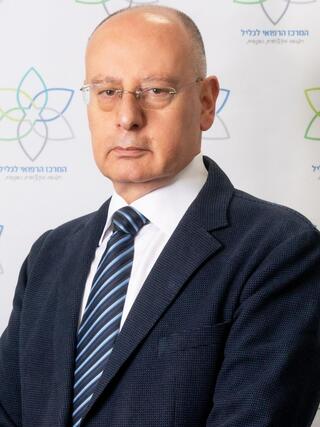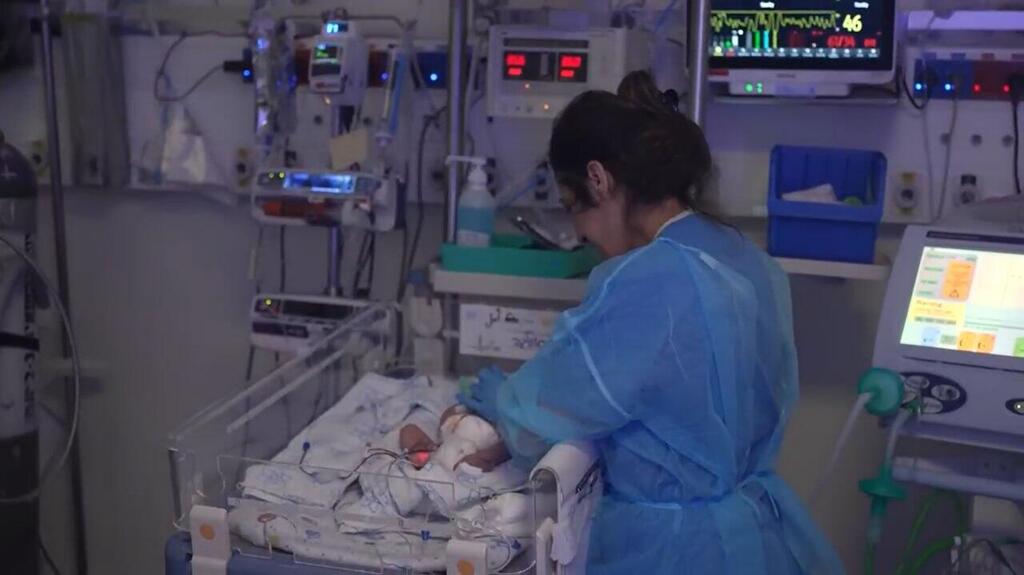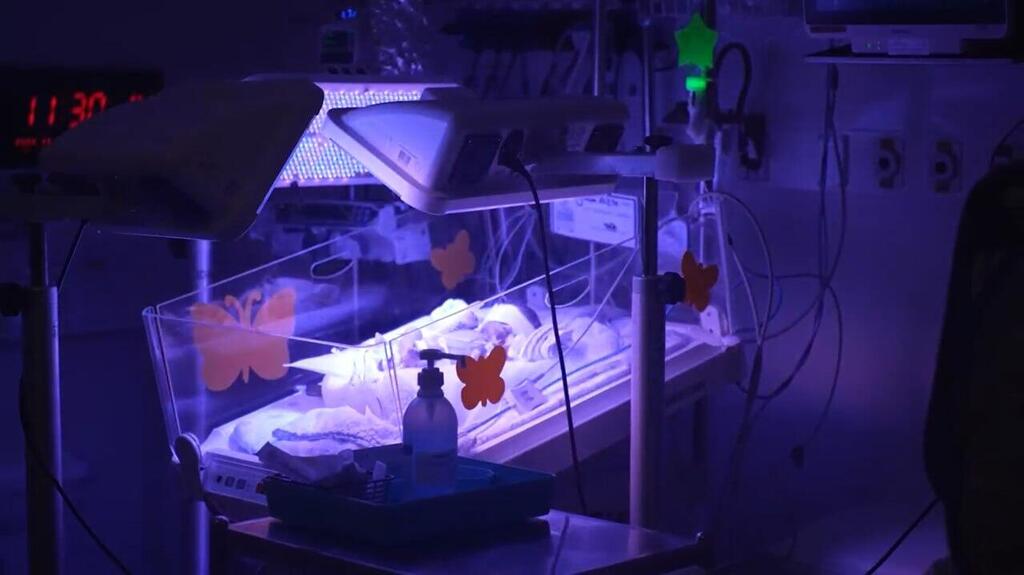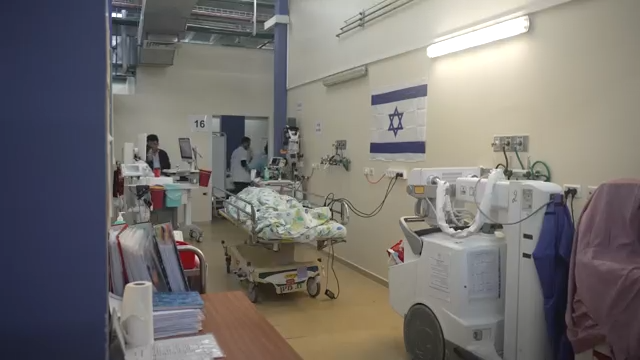Getting your Trinity Audio player ready...
Bathed in the faint glow of the neonatal ward at the Galilee Medical Center in Nahariya, the gentle whispers of infant cries intermittently permeate the serene quiet. The tiny newborns, their delicate bodies weighing from just a few ounces to slightly over two pounds, rest in peaceful slumber.
Read more:
A mere six miles from the hospital, the volatile confrontation line with Hezbollah looms, a simmering cauldron threatening to boil over at any moment. Thus, it's hardly surprising that the neonatal ward was the first to be relocated to the safety of the underground complex on October 7. The tiniest among the newborns, who initially weighed a mere 1.48 lbs., now tips the scale at 2.65 lbs. - It's fair to say he's on an encouraging upward trajectory.
That fateful Saturday, approximately an hour post the war's outbreak, Prof. Massad Barhoum, the director of the Galilee Medical Center, resolved to brace for any eventuality, even before the conflict in the north erupted. Thus, well ahead of the Ministry of Health's involvement, he rallied the management team from their homes.
The journey from that point to relocating the patient care departments to the underground safe haven was swift. Medical and logistical personnel spanning diverse specialties were summoned immediately to relieve the weekend crew, bracing for the potential escalation of the war to the northern frontier.
"The medical center finds itself in a precarious location, serving as a strategic asset for the State of Israel, its citizens, and the security forces safeguarding its northern frontier," articulates Prof. Barhoum.
"The recent war has underscored the brevity of our national memory and highlighted the importance of fortifying hospitals at Israel's northern and southern extremities during periods of relative calm. The frantic scramble to bolster Yoseftal in Eilat, Barzilai in Ashkelon, Ziv in Safed, and our own establishment in Nahariya in the heat of battle paints a rather unflattering picture of the Israeli health system."
 Prof. Massad BarhoumPhoto: Thomas Solinsky
Prof. Massad BarhoumPhoto: Thomas SolinskyDr. Tsvi Sheleg, the hospital's deputy director, vividly recalls the tense atmosphere of that morning: "By nine, we had assembled for a situation assessment, guided by the understanding that the north too was under threat. As the only hospital in the country, and perhaps even globally, situated a mere six miles from the border, we recognized the need to be proactive and take decisive action.
"Thankfully," Dr. Sheleg continues, "our hospital has the distinction of being the first in Israel to have all critical areas fortified: nine out of twelve operating rooms, laboratories, inpatient departments, the intensive care unit, and the CT room. All these areas are safeguarded within their regular work environments, as a trauma room doctor must know the location of the emergency thoracic surgery set, and for an operating room nurse to be familiar with the placement of various surgical instruments and devices."
This comprehensive protective measure was implemented after the Galilee Medical Center was directly hit by a missile during the Second Lebanon War in 2006.
"The recent war has underscored the brevity of our national memory and highlighted the importance of fortifying hospitals at Israel's northern and southern extremities during periods of relative calm. The frantic scramble to bolster Yoseftal in Eilat, Barzilai in Ashkelon, Ziv in Safed, and our own establishment in Nahariya in the heat of battle paints a rather unflattering picture of the Israeli health system."
Dr. Shaul Shasha, the renowned director of the Nahariya hospital, was a man of unwavering resolve. He made the audacious decision, much to the chagrin of many, to transform the underground complex into a fully operational emergency hospital. This facility was designed to withstand any threat, providing immediate care for the injured and ongoing support for the residents of Galilee.
This bold move was made amidst a flurry of confrontations and under the harsh glare of public criticism for what was perceived as squandering millions in a futile endeavor. Yet, Dr. Shasha remained steadfast, his vision unblurred by the storm of controversy, his commitment to the wellbeing of the Galilee community unyielding.
Transferring premature babies
The Ministry of Health gave the green light for the construction, "and so, early on the morning of October 7, following the orderly protocol we had practiced, we commenced the relocation of the wards underground," explains Dr. Sheleg. It was a daring move, especially the premature transfer, involving a complex and perilous logistical operation. Dr. Vered Shafer Fleischer, the head of the premature baby unit, was on standby the night before the war broke out.
Upon learning of the developments in the south from her home in Haifa, she rushed to the hospital immediately. "At 11:00 in the morning, the operation to transfer 17 premature babies to the underground facility commenced. It's crucial to grasp the complexity and challenges involved in transferring premature babies, as each infant, attached to medical equipment, is accompanied by a nurse, respiratory technician, and sanitarians. All this, after the underground location has been fully equipped with the necessary medical apparatus."
At 17:00, the successful transfer of the premature babies was completed. "When I talk about premature babies, I'm referring to a weight range between 28 ounces to a few pounds," explains Dr. Fleischer.
For almost two months now, the premature babies have been receiving care under different conditions. "Life in the underground space is anything but simple and presents significant challenges, but that's no excuse to compromise our medical standards. The dedication to our work remains unwavering. I am here to address the concerns of anxious parents, and when one of them is in distress and requests to speak with a psychologist, I will ensure it happens immediately."
3 View gallery


Taking care of a tiny newborn underground, six miles away from Hezbollah
(Photo: Assaf Magal)
The second-largest hospital in the north caters to a population of approximately 650,000 residents with 775 hospital beds, 475 of which are designated for emergencies. Like other hospitals in the periphery, it has endured years of severe budget constraints from the government, primarily manifesting in the lack of additional staff to address the critical shortage and the absence of essential upgrades to life-saving equipment.
"While hospitals in the central regions of the country benefit from generous donations, hospitals in the periphery occasionally receive modest donations, if at all," remarks Dr. Sheleg. It appears that donors prefer to have buildings named after them in central hospitals rather than in Nahariya.
Complex medical cases pose significant obstacles
The patients, many of whom are seniors requiring respiratory aid, are given top-notch care, even under these challenging hospitalization conditions that leave no room for visitors to sit. The medical staff themselves are navigating the tight confines of their workspace. A glimmer of hope comes in the form of a decreased hospitalization rate, likely due to the population's migration away from the southern border. This shift means each patient garners more attention.
In the surgical ward, the conditions are far from ideal. "The density undeniably has a profound impact. All departments are squeezed into a small, narrow space. You can see the congestion; some patients chose not to be hospitalized here and opted for another hospital," shares Dr. Bashir Mamon from Sakhnin, a gastroenterology specialist who was honored with the Outstanding Resident Award from the Medical Association this year.
"It's incredibly crowded and there's zero privacy. My neighbor's bed is practically touching mine. There's no TV here, but the service is top-notch. The doctors and nurses are always available, a physiotherapist visits me regularly, and since I'm confined to my bed, they ensure I'm kept clean."
"It's challenging to treat severe and complex patients, in terms of routine procedures and infection prevention." Nurse Ahmad Zbeidat concurs, "Working underground is difficult due to the density. There's an excess of visitors; the rule is one visitor per patient, but in reality, more show up."
The patients, many of whom are elderly and some require respiratory assistance, are deeply appreciative of the extraordinary efforts made by the medical team, despite the challenging conditions, in their quest to provide the best possible care. Khaled Abd El-Ghanem, currently in the orthopedic department following a car accident, shares his experience.
"I arrived here ten days ago and have already undergone two surgeries. It's tough here," he admits, "It's incredibly crowded and there's zero privacy. My neighbor's bed is practically touching mine. There's no TV here, but the service is top-notch. The doctors and nurses are always available, a physiotherapist visits me regularly, and since I'm confined to my bed, they ensure I'm kept clean."
Shagit Kuchuk, a clinical supervising nurse in the surgical complex, also manages to find a silver lining in the situation: "The conditions here are a world away from what we have above ground. The patients are housed in compact units, and our primary challenge revolves around ensuring the safety of the care we provide and the sense of security we offer to the patients. Even in times of war, positive aspects emerge as a result of the density that fosters a sense of intimacy and creates connections between the different teams - I'm talking about collaborations that only happen here and wouldn't occur above ground."
'Nurses darting from one place to another'
Shoshana Mandelovich, a spirited 72-year-old from Acre, found herself in the underground orthopedic department after a mishap: "I was climbing a ladder to clean and took a tumble. The fall resulted in a broken hip joint. After undergoing surgery here, I was moved to this shielded ward. The crowding is a challenge, but the care is exceptional and the service is top-tier. The staff genuinely care about the patients and are incredibly attentive to us. It's not a walk in the park for them either; I see how the nurses are darting from one place to another, making considerable efforts to provide us with the best care possible."
Since the northern front joined the fray of the Hamas war in Israel, the Galilee Medical Center has become a beacon of hope for dozens of trauma victims - over 50 in total, most of them in mild condition. "If the northern front escalates, and it's not a question of if but when, we are bracing ourselves for prolonged missile attacks. Every week, we rehearse for this extreme scenario," shares Dr. Sheleg. "In our fortified emergency room, staffed also by a representative from the Ministry of Health and aided by a computerized system, we function at our best."
In the premature baby complex, we encountered 18 tiny miracles, and also had the pleasure of meeting Tahel and Noam Bar-on, a young couple from Acre, who are new parents to their firstborn daughter, Leah, born weighing a mere 1.970 kg. On this joyous day, they were taking their little bundle of joy home.
"She arrived earlier than expected, catching us off guard," the new parents share, "and despite the war and our proximity to the border, we chose to bring her into the world right here in Nahariya, because we knew the staff is trustworthy and has a sense of responsibility and that everything would be alright. Leaving her behind during the war days was incredibly hard.
"We had complete faith in the doctors. They gave us the confidence that we were leaving her in capable hands. The situation across the country is far from easy. We're all experiencing a kind of collective mourning," Noam admits.
"But even in these circumstances, we managed to find a sliver of joy that will show all the people of Israel that we are here to stay, and with God's help, we will remain strong, happy, and the people of Israel will prevail."




